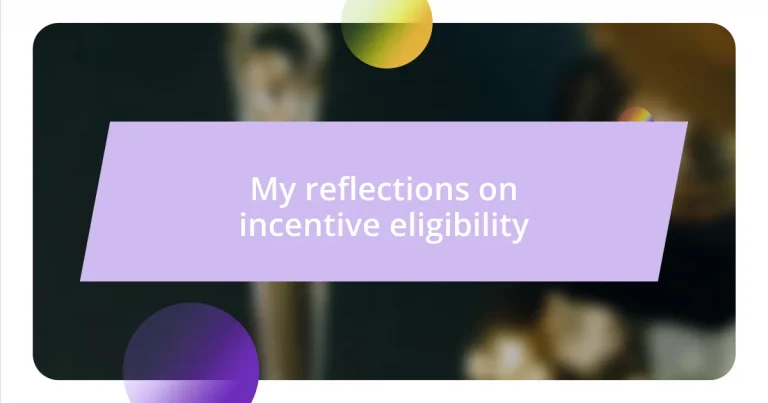Key takeaways:
- Understanding the nuanced eligibility criteria for incentives is crucial, as missing small details can lead to disqualification.
- Qualifying for incentives boosts motivation, job satisfaction, and career advancement while also providing financial benefits and recognition.
- Regularly seeking feedback, tracking personal goals, and evaluating team dynamics are essential for improving eligibility and assessing the success of incentive programs.
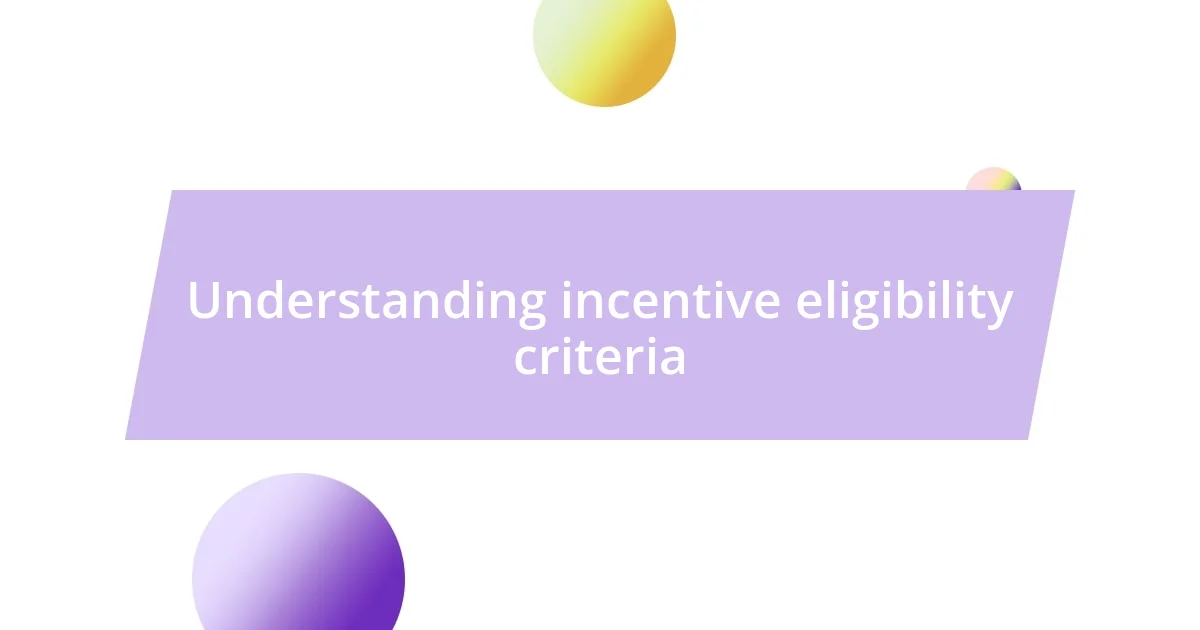
Understanding incentive eligibility criteria
Understanding incentive eligibility criteria often hinges on various factors specific to the program in question. From my experience, I’ve seen how easily people can overlook the nuances that determine eligibility, leading to frustration when they find out they don’t qualify. Have you ever felt that excitement of finally qualifying for an incentive, only to discover a small detail that negated it all?
When I first navigated through the maze of eligibility requirements, I found it overwhelming. The fine print can make a big difference, and missing just one requirement can disqualify you. It’s crucial to dissect the criteria thoroughly—after all, informed decisions stem from understanding every piece of the puzzle.
Incentive programs often evaluate factors like performance metrics, participation levels, or tenure within a company. I remember a friend who just barely missed out on a great incentive because they didn’t track their metrics closely enough. It’s a stark reminder that in the world of incentives, attention to detail can be the key to unlocking those benefits we all strive for.
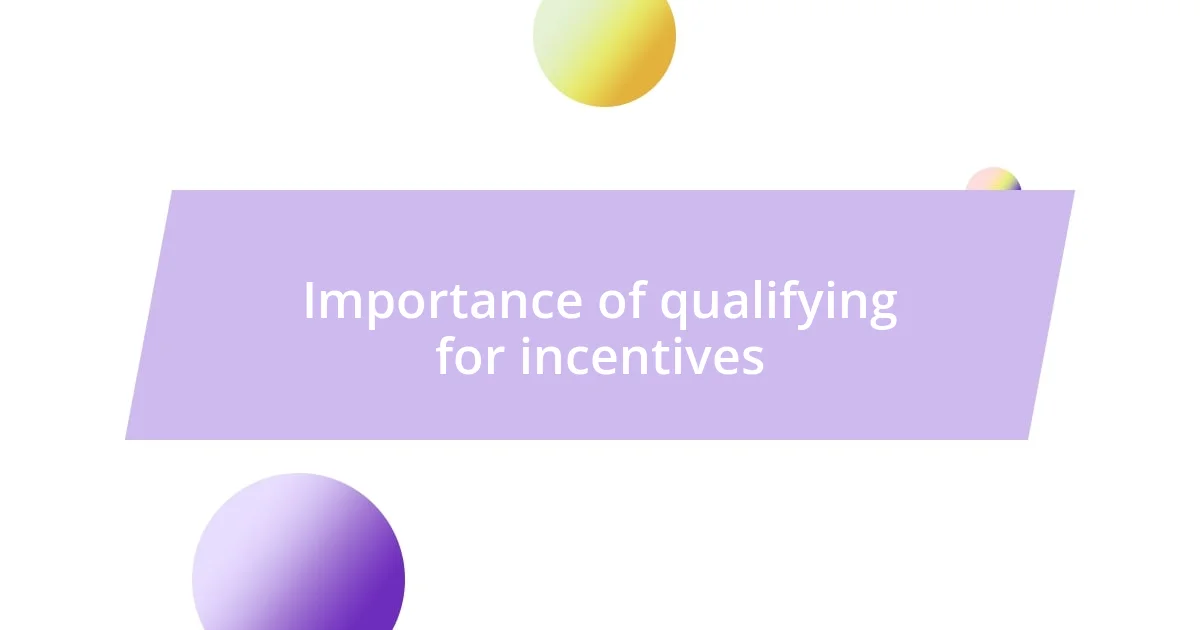
Importance of qualifying for incentives
Qualifying for incentives is an essential part of striving for personal and professional growth. I’ve seen firsthand how securing an incentive can often be the motivation someone needs to elevate their performance or enhance their skill set. Remember the sense of pride that comes with achieving a goal? That exhilaration can be magnified when it’s tied to tangible rewards.
- Access to additional resources or training.
- Recognition and appreciation from peers and management.
- Increased job satisfaction and motivation.
- Enhanced career advancement opportunities.
- Financial benefits that can alleviate stress.
Reflecting on my journey, there have been times when qualifying for incentives truly shifted my perspective. I recall when I was working hard on a project, and my focus on the details led me to not only meet my targets but also exceed them. The incentive was a pleasant surprise, but what mattered more was the boost in my confidence and the acknowledgment from my supervisors. It reinforced my belief that understanding and meeting eligibility requirements isn’t just about the tangible rewards—it’s about pushing ourselves to achieve what we often think is out of reach.
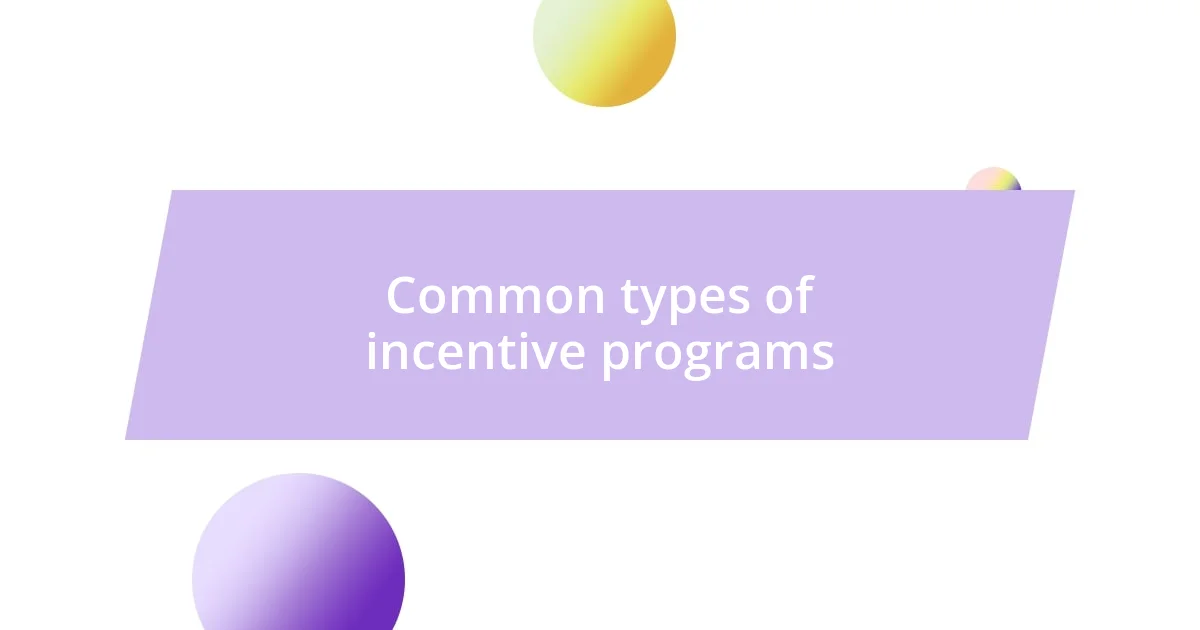
Common types of incentive programs
Incentive programs come in various forms, each designed to motivate and reward specific behaviors or achievements. Common types include performance-based incentives, which reward employees for meeting or exceeding defined targets. I remember a time when my dedication and teamwork resulted in not just meeting sales goals, but also earning a bonus that felt like the cherry on top. Then, there are profit-sharing programs, where employees receive a portion of the company’s profits. This fosters a sense of ownership, and who doesn’t feel more invested when the company’s success directly impacts their wallet?
Another type to consider is recognition-based incentives. These might not always come with financial rewards, but the acknowledgment can be incredibly powerful. For instance, there was a time when my contributions to a project led to a public recognition award at my workplace. The applause felt so rewarding, and that moment solidified my commitment to the team. Lastly, there are retention bonuses aimed at keeping top talent within the organization—these can be crucial during periods of change, as I learned when a close colleague received a retention bonus that made them rethink their career plans despite opportunities elsewhere.
Now, let’s break down these common types in a quick comparison table:
| Incentive Type | Description |
|---|---|
| Performance-Based Incentives | Rewards for meeting or exceeding specific targets. |
| Profit-Sharing Programs | A portion of company profits shared with employees, enhancing their ownership. |
| Recognition-Based Incentives | Acknowledgment and rewards that boost morale and commitment. |
| Retention Bonuses | Financial incentives to retain key employees during organizational changes. |
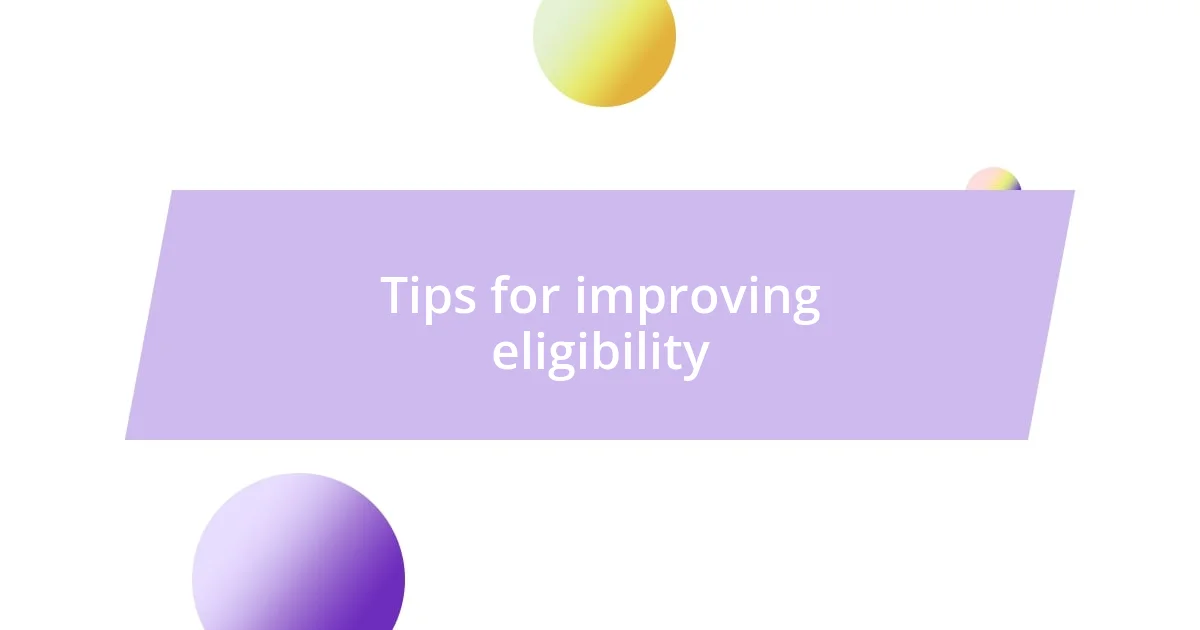
Tips for improving eligibility
Improving eligibility for incentives can often hinge on understanding the specific criteria that programs require. In my experience, staying informed about program details makes a significant difference. Have you ever missed out on something simply because you weren’t aware of the requirements? I know I have. When I took the time to dig deep into the guidelines, I found not only clarity but also a roadmap that helped me strategize my efforts effectively.
Another practical tip is to consistently set and track personal goals aligned with the incentive criteria. I remember when I decided to document my progress weekly; this practice transformed my approach. Watching small victories accumulate over time kept me motivated and focused. It was like seeing a puzzle come together piece by piece, revealing a rewarding picture of my commitment and hard work.
Engaging with peers and management can also provide valuable insights into improving your eligibility. I often sought feedback from my supervisor, which not only enhanced my understanding but also demonstrated my eagerness to grow. This proactive communication can open doors to opportunities you might not have otherwise considered. How do you typically receive feedback? I find that embracing it can be one of the most empowering steps toward achieving those coveted incentives.
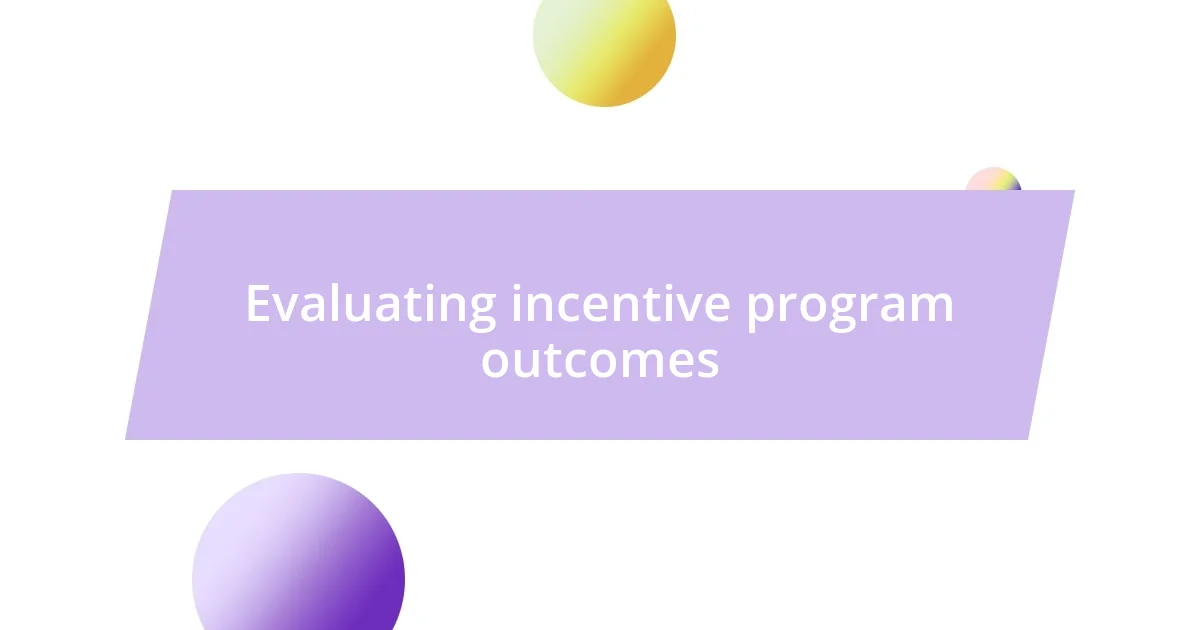
Evaluating incentive program outcomes
Evaluating the outcomes of incentive programs involves more than just checking if goals were met. I’ve often found that a key factor in assessing success is looking at employee motivation and satisfaction levels. I once participated in a sales contest where the prize was compelling, but what struck me most was the energy and excitement it generated among my team. Did the program leave us feeling more driven and connected? Absolutely.
Another crucial aspect is measuring tangible results against the program’s objectives. For instance, when our department implemented a performance-based incentive, we didn’t just see sales figures rise; there was a noticeable increase in collaboration and a shared commitment to success. It was fascinating to witness how the right incentives could elevate team dynamics. Have you ever seen a single change ignite a collective passion in your workplace? It’s truly eye-opening.
Lastly, gathering feedback post-implementation is essential. I remember when my team was invited to share our thoughts on an incentive program, and our insights led to tweaks that made it even more effective. Listening to participant experiences can reveal what worked and what didn’t. It’s all part of the ongoing process of refining these programs to ensure they truly resonate with employees. Isn’t it amazing how the conversation around incentives can shape their effectiveness?

Reflecting on personal experiences
Reflecting on my personal experiences with incentive eligibility, I realize how much they shape not just our professional journey but also our mindset. I recall a time when I overlooked a crucial requirement for a performance bonus, and it left me feeling frustrated and disheartened. It’s moments like these that remind me of the importance of vigilance in understanding the criteria—after all, knowledge is empowering, isn’t it?
One experience that stands out is when I joined a team striving for a collective sales target. The excitement in the air was palpable, as each of us passionately tracked our progress. I vividly remember how every small success felt like a personal victory. Celebrating those milestones together fostered a sense of camaraderie, making the entire journey far more enjoyable. Have you ever felt that collective energy energizing your efforts? It’s amazing how shared goals can create a motivational spark within a team.
There was also a time when I had to rethink my approach after receiving constructive feedback about my eligibility for an incentive program. Initially, it felt like a setback, but I took it as an opportunity for growth. The adjustments I made not only enhanced my performance, but they also shifted my perspective on the importance of adaptability. How do you view feedback? For me, I’ve learned to see it as a roadmap to personal development, leading me towards greater achievements.












